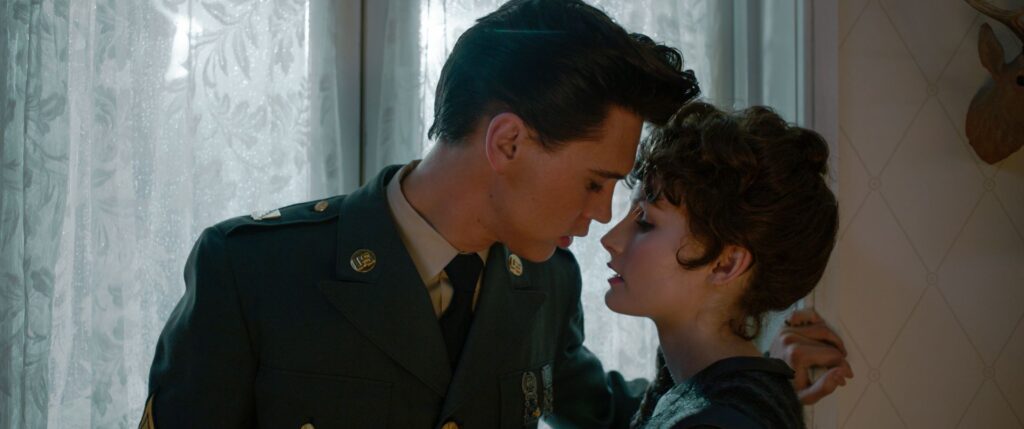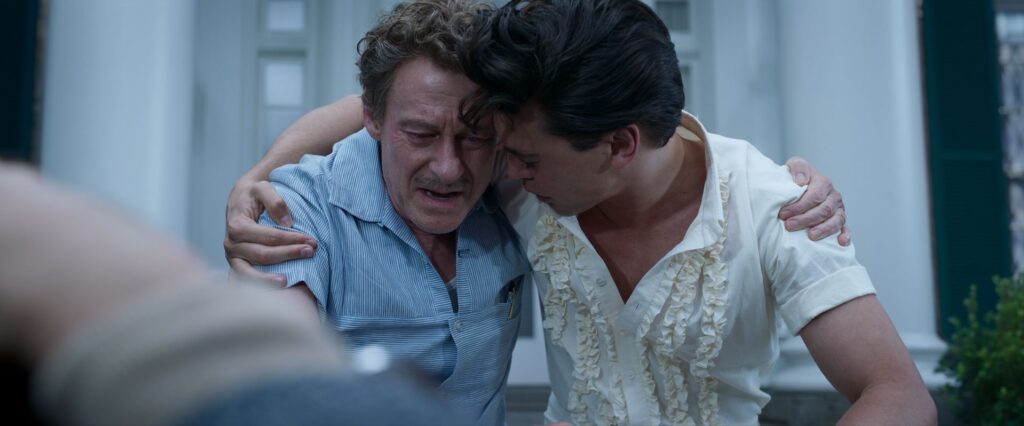Any movie review of “Elvis” will need to be based on putting aside all of what you thought you knew of “The King”. Is the legend in your mind based on truth or media highlights? Elvis through the creative eyes of Baz Luhrman and the proxy of Col. Tom Parker is an eye-opening, mind shocking stand-alone masterpiece. How you can embrace and unravel a 24-year career in a 2-hour 40min experience is incredible but this is a stunningly crafted media chalice.
In line with the same glitter of past Baz Luhrman movies, the opening brings us gem’s glittering like the rhinestones of an Elvis Las Vegas costume or belt buckle. This reflects how the film is able to show aspects of the entertainer’s diamond, a life that has been on show since 1953, but now in a new light, is drawing us into a tale that is both ingratiating and painful for any fan, (young or old), or simply the historical admirer.
I have to think of this story as a tribute to tragedy. While his death in August 1977 could be seen as the tragic triumph of a successful young rock’n’roll career, it actually punctuates the impact of the Elvis story which still continues today. You may be thinking, shouldn’t it be a tribute to the record-breaking successes. Elvis experienced concerts sold-out weeks in advance, record sales, Las Vegas sell-outs and long-term contracts always winning in his favour. We know Elvis as the world’s most successful singer/entertainer of all time. Stories of pink Cadillacs and multiple TVs in every room seemed to display the excess of a life that could do no wrong in the circles of entertainment. From the early years of singles from Sun Records on the local DJ’s spin table to opening the doors of movies with Hollywood, the world wanted more Elvis. Possibly more than the man from Tupelo, Memphis Tennessee could give.
Try as we do to see the Elvis story as a life to be desired, it was a life that frequently saw the intersection of desperate and sad events that really captured the soul of a man who kept coming back to the gospel, its music and some deep “God-fearing” heritage of the south. Elvis’s life began as a surviving twin. Sadly his mother Gladys lost Jesse at birth. This became a hallmark over Elvis’ life that either Jesse was watching over him or that he should fight with the strength of the “two men within him” to face the world. With his father, played in Elvis by Richard Roxburgh, heading to prison for a time, Elvis and his mother moved into the coloured part of town living a life amongst the churches, whorehouses and a poor survival-based community that started to shape Elvis’s personality. From comic book-loving to music playing, the star was born.
Out of this experience, his relationship with his mother deepened but would also set him up for the tragedy of losing his first love. From high school, this first recording in 1953 with Sam Phillips at Sun Records, was the beginning. This would lead many artists on to a semi-successful local or possibly national career and they would be satisfied. However, the Elvis Presley story would change direction for the stratosphere, almost by accident. With local AirPlay and time on stage for the Louisiana Hay Ride concerts, it was a certain sideshow charlatan by the name of Col. Tom Parker, address unknown who happened upon the young artist’s trajectory. Parker already promoting artists like country star Hank Snow would very quickly reprioritise the star of Elvis to be the horse he wanted to hitch his wagon to.

In the eyes of young women in the audience, Parker saw the reflection of the young star’s potential shining through his soulful black vocal sound while presenting a white gyrating superstar on stage. The movie shows us the stirring in the US southern states that this rock’n’roll star was producing. Swooning girls and out-of-control concerts led to the community leaders wanting Elvis off the television and commands for him to ‘stand still’ while performing on stage. But the hips wouldn’t listen.
Elvis became a picture of rebellion and at one point a pariah of communities. People were saying he needed to be filmed from the hips up and there were calls for jail time. Elvis, was considered a thorn in the side of the leaders of society who were still interested in segregation and didn’t want their children, or their daughters out, rocking and rolling. But within the tension was the realisation this was a freight train of money making entertainment that no one was going to stop.
Shipped off to Germany through the draft for two years could have been meant to clean up the image but would the artist survive the hiatus. For Elvis, the sojourn as a soldier brought us GI Blues and for Elvis, an introduction to the mature, 16yo looking but 14yo Priscilla, a daughter of one of the personnel who Elvis met at a party. While speculation on their relationship started as Elvis returned to the US, it wasn’t until later that Priscilla came to the USA where they were married in 1967.

The cast of Elvis is strong from family members through to music icons like B.B. King, Little Richard and Mahalia Jackson. Australian actors abound with Richard Roxburgh as Hank Snow and Luke Bracey as Jerry Schilling. David Wenham as Elvis’ Father Vernon and Helen Thomson as his mother Gladys, brings the strength of a mother dealing with adversity and still shows the cracks that opened to alcoholism that would again bring more tragedy into Elvis’s life. Olivia DeJonge gives an engaging performance swinging between demure and the strength of walking out on Elvis when he no longer respected their relationship which resulted in their 1972 divorce.
However, it is the embodiment of the two main characters of Elvis and Col. Tom Parker played by Austin Butler and Tom Hanks who hold together this epic biopic. Austin Butler has embraced the opportunity to play Elvis through the years from naïve to confident and finally into a vulnerable recluse resigned to his role in the gilded cage of a Las Vegas hotel room or his Gracelands estate. We know the world abounds with Elvis impersonators and sure, the real Elvis was last spotted in a supermarket in Brazil, but Butler provides an empathetic shell into which you can be absorbed through his eyes.
For Tom Hanks, the proof continues that comedians are both the best impersonators and also able to transform into serious acting roles so much better than the reverse argument. Using Col. Tom Parker as a vehicle for telling the Elvis story treads on toes and certainly does no favours to the Parker family name. However, let’s remember, that’s not his real name.

Col. Tom Parker may have had a very dubious relationship with Elvis, that’s fair to say. Did he take more than his share of the winnings? For many years, yes. But would the world have seen Elvis if not for the Colonel? I’d say no. From promotional opportunities, merchandising like the world had never seen before and breaking media channel boundaries, it was Parker that changed the way artist representation is carried out.
If it wasn’t for the enthusiasm and representation of Colonel Tom Parker we likely wouldn’t have seen Elvis movies or the Las Vegas experience. What I thought was an initial nine-picture Hollywood deal resulted in 31 acting credits in his career. Later, some of the movies started to bomb and people grew a little bit jaded with the Elvis screen stories and that needed to be reshaped. In the movie we see Elvis trying to break through. He sought out to reimagine his original passion through Steve Binder played by Stranger Things actor, Dacre Montgomery, who is the film creative who is said to be the man who relaunched Elvis’s career.
Colonel Tom Parker was now interested in having Elvis settle into family entertainment. His television experience would be sponsored by the likes of Singer sewing machines. Clothed in lovely little red sweaters while singing Santa Claus is Coming to Town was choking the Elvis spirit. Through Steve Binder a new intimate Leather Jacket performance experience in 1968 relaunched his persona.
And yet one of the things that continue to amaze me is that Elvis never travelled the world. Fan bases in Japan, Germany, and the UK wanted to see Elvis Presley. The Beatles were touring, the Rolling Stones were touring, so why not Elvis Presley? Later Elvis discovered that Colonel Tom Parker was a mystery, unknown name, an illegal alien, with no passport and no ability to accompany Elvis overseas.
It became more and more apparent that it was his inability to follow Elvis overseas that meant Elvis continued to tour the States of America until finally, Colonel Tom Parker was able to close off his career in the gilded cage within the Las Vegas hotels. When the International Hotel was opening in Las Vegas and was wanting an opening star, apparently a deal was signed and sealed prior to the hotel opening. Elvis was a million-dollar-a-year act and he could have anything he wanted on that stage. And so Elvis stayed there for many years living up in the International Hotel, his beloved Gracelands where he loved Priscilla and his little girl, Lisa Marie.
In the early stages of the Las Vegas era, it was said that this was the best Elvis ever but as time went by, and Elvis became more and more jaded, gaining weight and fluctuating in emotional outbursts he relied on “Dr Nick”(George C. Nichopoulos), a doctor who would keep him up when he needed to be up and down when he needed to be down and alive when he needed to be ready to take the stage.
The movie alludes to the fact that the gambling debts of Colonel Tom Parker were part of the reason for the deal being done at the International Hotel. In essence, as long as Elvis was on stage, Colonel Tom Parker had access to a limitless line of credit. In one documentary about the life of Elvis and Parker, one of the Memphis Mafia, the people who followed Elvis around, said that on one night Parker lost 1.5 million dollars in his gambling, often on his favourite the roulette wheel. The signing of the hotel contract was also said to ensure he was forgiven for all of his previous debts in the land of the mafia, a place where you didn’t want to be walking on the wrong side of favour.

One positive shown in Elvis the movie was the creative spirit he was able to put into his Las Vegas stage show at the International Hotel. That Elvis was the one I absolutely loved in the movie because it seemed to be an Elvis stripped of concern or responsibility and enjoying what he lived for, the music. His heart and creative spirit are on display.
Overall, Baz Lurhman’s story of Elvis tells the tale of how Colonel Tom Parker really abused his relationship representing Elvis to believe that he was able to take 50% of Elvis’s earnings over the course of his 24-year career. Alongside that, Colonel Tom Parker not only was skimming off the top and skimming off the middle but also when they fell out late in the 70s over Parker’s control and gambling debts. In the movie Parker was still trying to take $8 million dollars off Elvis which would break the Elvis Presley estate, essentially trying to say that these were for lost costs along the way. Post Elvis’s death it was a lot of court cases before Colonel Tom Parker actually withdrew, settled out of court and was known to be wandering the casinos of Las Vegas following his gambling addiction, and the many millions of dollars that he had still made out from his experience with Elvis Presley.
As is any tribute to any Baz Lurhman movie, this was a unique media experience. Mash-ups of the camera, media recordings and sound make for an eclectic movie but one that still strongly walks through the heart, mind and footprints of a musical legend.



